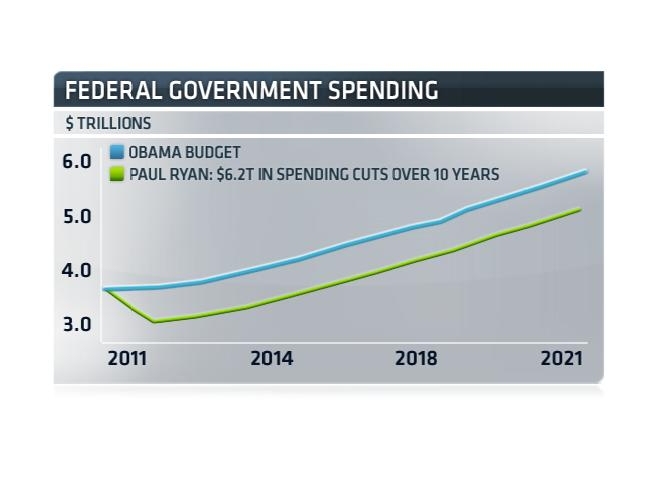Why the Budgetary Game Is a Big Taxpayer Scam
A Commentary by Lawrence Kudlow
Here's some friendly fiscal advice: Anytime some Washington big-shot like Ben Bernanke or Tim Geithner claims that immediate spending cuts in the debt deal will harm the economy -- ignore them. Completely. You know why? Because in this great country of ours, spending never goes down. Never.
Take a look at the chart. The blue line you see is President Obama's budget. The green line is Rep. Paul Ryan's budget.
Now, Paul Ryan's is of course a couple of trillion dollars lower than Obama's over the next 10 years. But what do they both have in common? They both go up. As in spending more, not less. As in, roughly $40 trillion to $45 trillion dollars more. That's a whole lot of taxpayer money, folks.
Now why is this? It's because of something called the "current services baseline," which includes population and inflation increases built into the budget. Entitlements have their own formulas.
So when you hear a politician tell you they're cutting spending, they're actually referring only to reducing the growth of spending. Rarely, if ever, do they actually reduce the level of spending.
Think of it this way: You're out car shopping and thinking about buying a $100,000 Mercedes. That's your target. But then you decide to forego the Mercedes and opt for a $20,000 Chevy, instead. Well, guess what? Congress would score that as an $80,000 budget cut. Huh? We all know that it's actually a $20,000 budget increase.
Let's be honest here. This budgetary game remains one big taxpayer scam. Look, I used to work in the federal budget office. I know the game.
Here's yet another scam: Big budget deals say they "cut" (there's that word again) a couple of trillion dollars over 10 years. But most of it is targeted for the last couple of years, as in years eight, nine and 10. So basically it'll never happen. It's four or five congresses from now. Laws change. Deals are broken.
At the end of the day, the only thing that really matters is next year's budget. Will it be cut? Ever in my lifetime? Because if it were cut, it would bring that line in that chart above down. Now that would be called a decline. All of that other stuff? Increases.
When business cut expenses, the spending line declines. But when government cuts spending, the spending line always rises. Think of it.
Larry Kudlow, National Review Online's Economics Editor, is host of CNBC's "The Kudlow Report" and author of the daily web blog Kudlow's Money Politic$.
COPYRIGHT 2011 CREATORS.COM
See More Commentary by Lawrence Kudlow.
See Other Political Commentary.
Views expressed in this column are those of the author, not those of Rasmussen Reports. Comments about this content should be directed to the author or syndicate.
Rasmussen Reports is a media company specializing in the collection, publication and distribution of public opinion information.
We conduct public opinion polls on a variety of topics to inform our audience on events in the news and other topics of interest. To ensure editorial control and independence, we pay for the polls ourselves and generate revenue through the sale of subscriptions, sponsorships, and advertising. Nightly polling on politics, business and lifestyle topics provides the content to update the Rasmussen Reports web site many times each day. If it's in the news, it's in our polls. Additionally, the data drives a daily update newsletter and various media outlets across the country.
Some information, including the Rasmussen Reports daily Presidential Tracking Poll and commentaries are available for free to the general public. Subscriptions are available for $4.95 a month or 34.95 a year that provide subscribers with exclusive access to more than 20 stories per week on upcoming elections, consumer confidence, and issues that affect us all. For those who are really into the numbers, Platinum Members can review demographic crosstabs and a full history of our data.
To learn more about our methodology, click here.




